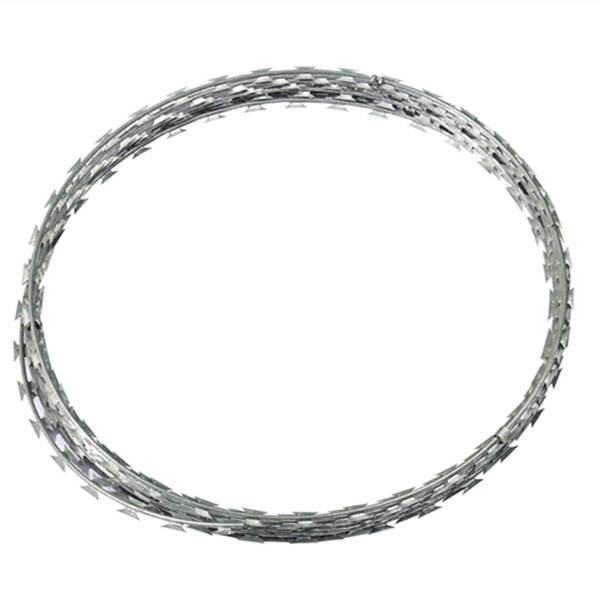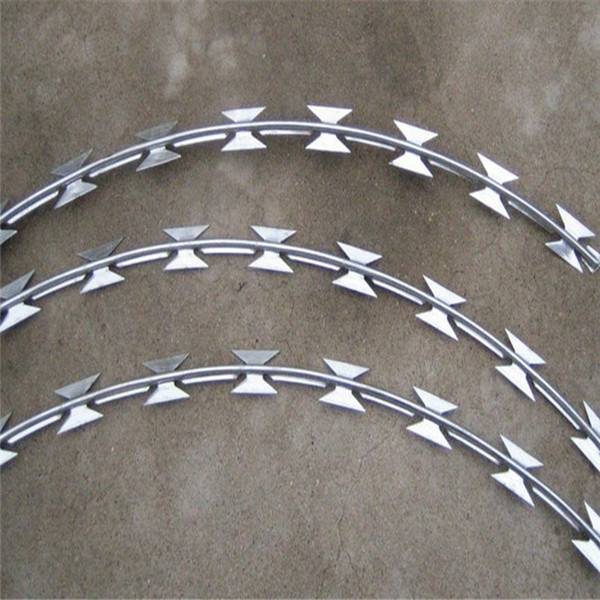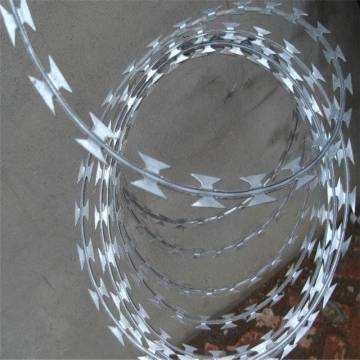
Sep . 23, 2025 14:10 Back to list
High-Security Razor Wire: Buy Coils, Mesh & Flat Wire
Understanding High-Security Perimeter Solutions: The Role of razor wire
In the realm of perimeter security, the demand for robust, effective, and deterrent solutions is perpetually escalating. Industries ranging from governmental facilities to critical infrastructure require uncompromising security measures. Among the most formidable options available, razor wire stands out as a highly effective and visually dissuasive barrier. This comprehensive guide delves into the technical aspects, applications, and strategic considerations for deploying this essential security element.
Often referred to as barbed tape or concertina wire, razor wire is engineered with sharp blades or barbs at close intervals along a strand of high-tensile wire. Its design is specifically crafted to prevent unauthorized access by creating a formidable physical and psychological barrier. This material is indispensable across various sectors for safeguarding assets, personnel, and sensitive areas against intrusion.
Current Industry Trends and Market Dynamics
The global security market is experiencing significant growth, driven by increasing geopolitical instability, rising crime rates, and the need for enhanced protection of critical infrastructure. The razor wire segment, in particular, is witnessing sustained demand. Innovations are focusing on enhanced corrosion resistance, easier installation, and more discreet integration into existing security architectures.
Key trends include a shift towards galvanized and stainless steel variants for extended service life, especially in harsh environments. There's also a growing interest in aesthetic solutions, such as green razor wire, which blends more seamlessly into landscaped environments without compromising security effectiveness. The market for flat razor wire is expanding due to its suitability for wall-top installations where traditional concertina coils might be less practical or visually obtrusive. Moreover, the integration of perimeter security systems with advanced surveillance technologies (CCTV, intrusion detection) is becoming standard, requiring razor wire solutions that can be effectively monitored.
According to recent market analyses, the global perimeter security market is projected to reach USD 30-40 billion by 2028, with physical barriers like razor wire maintaining a substantial share due to their fundamental role in deterring and delaying intruders.

Technical Specifications and Material Science
The efficacy of razor wire hinges on its precise technical specifications and material composition. High-quality razor wire is typically manufactured from hot-dipped galvanized steel or stainless steel, offering superior corrosion resistance and longevity.
Blade Types and Core Wire
- Blade Types: Common blade profiles include short barb (BTO-10, BTO-12), medium barb (BTO-18, BTO-22), and long barb (BTO-30, CBT-65). The choice depends on the desired deterrent effect and specific security requirements. The larger the barb, the greater the deterrent.
- Core Wire: The core wire, typically high-tensile steel, provides the structural integrity. Standard diameters range from 2.5 mm to 3.0 mm. Its tensile strength, often exceeding 1400 N/mm², prevents easy cutting or bending.
- Coating: Zinc coating for galvanized wire adheres to standards like ASTM A641/A641M (Standard Specification for Zinc-Coated (Galvanized) Carbon Steel Wire). Stainless steel (e.g., AISI 304, 316) offers superior chemical resistance, crucial in industrial or coastal environments.
Typical Product Specifications
| Parameter | Concertina Coil Razor Wire | Flat Wrap Razor Wire | Razor Wire Mesh |
|---|---|---|---|
| Material Options | Galvanized Steel, Stainless Steel (304, 316) | Galvanized Steel, Stainless Steel (304, 316) | Galvanized Steel, Stainless Steel (304, 316) |
| Coil Diameter (Unextended) | 450mm, 600mm, 750mm, 900mm | 500mm, 700mm, 900mm | Panel Size Varies (e.g., 2m x 1.5m) |
| Core Wire Diameter | 2.5 mm - 3.0 mm | 2.5 mm - 3.0 mm | 2.5 mm |
| Blade Type (e.g.) | BTO-22 (22mm blade length) | BTO-22, CBT-65 | BTO-22 |
| Standard Coil Length (Extended) | 7m - 15m (per razor wire roll) | 15m - 30m (per roll) | N/A (panels) |
| Tensile Strength of Core Wire | >1400 MPa | >1400 MPa | >1400 MPa |
| Zinc Coating Weight | 80-270 g/m² (Galvanized) | 80-270 g/m² (Galvanized) | 80-270 g/m² (Galvanized) |

The Manufacturing Process of Razor Wire
The production of high-quality razor wire is a precise multi-stage process, ensuring durability, consistency, and optimal security performance. Adherence to international standards like ISO 9001 for quality management and relevant ASTM specifications for materials is paramount.
Process Flow:
- Material Selection: High-carbon steel wire rods are selected, typically C1070 to C1080 grades, known for their tensile strength. For corrosion resistance, these are often pre-galvanized or selected in stainless steel (e.g., AISI 304, 316). The zinc coating for galvanized wire is applied according to ISO 1461 standards, ensuring a minimum coating weight (e.g., 200 g/m²) for extended service life.
- Wire Drawing: The selected wire rods undergo a cold drawing process to achieve the desired core wire diameter (e.g., 2.5 mm or 3.0 mm) and enhance tensile strength. This is a critical step affecting the wire's resistance to cutting.
- Steel Strip Slitting: Flat steel sheets (either galvanized or stainless steel) are precisely cut into strips of specific widths, which will form the blade tape. This process utilizes high-precision slitting machines.
- Blade Punching (Stamping): The steel strips are fed into a specialized punching machine. This machine, often employing high-speed presses, cuts and forms the distinctive razor wire blade patterns (e.g., BTO-22, CBT-65) along the length of the strip. The precision of the dies is crucial for consistent blade sharpness and spacing.
- Crimping and Assembly: The punched razor tape is then mechanically crimped around the high-tensile core wire. This is done with specialized machinery that securely wraps and locks the barbed tape onto the core wire, ensuring it cannot be easily removed or unwound.
- Coiling and Clipping: For concertina razor wire roll, the assembled single-strand barbed wire is then formed into continuous coils. Adjacent loops of these coils are secured together at regular intervals (typically 3 or 5 clips per loop) using heavy-duty galvanized or stainless steel clips. This creates the characteristic spiral formation that provides enhanced deterrent capability. For flat razor wire, the coils are flattened and attached to a rigid frame or wire mesh.
-
Quality Control and Testing: Throughout the process, strict quality control measures are implemented. This includes:
- Material Composition Analysis: Ensuring steel grade and coating thickness meet specifications.
- Tensile Strength Testing: Core wire samples are tested to verify they meet or exceed specified tensile strength (e.g., using ASTM A370 standards).
- Blade Sharpness and Integrity: Visual and tactile inspections ensure consistent sharpness and secure attachment of blades.
- Corrosion Resistance Testing: Salt spray tests (e.g., ASTM B117) are performed on galvanized and stainless steel samples to predict service life under various environmental conditions.
- Dimensional Accuracy: Coil diameter, blade spacing, and wire diameter are measured to ensure compliance with product specifications.
- Packaging: Finished coils are compressed and securely packaged, often in waterproof paper and woven bags, to protect them during transit and storage.
This rigorous manufacturing and testing protocol ensures that the final razor wire product delivers maximum security, extended service life (often 10-25 years depending on material and environment), and reliability for target industries like petrochemicals, metallurgy, water supply & drainage, power generation, and military installations.
Application Scenarios and Technical Advantages
The versatility of razor wire allows for its deployment in a multitude of high-security applications, each benefiting from its inherent deterrent and protective qualities.
Typical Application Scenarios:
- Military Bases and Border Security: Providing an impenetrable barrier against unauthorized entry.
- Correctional Facilities: Enhancing the security of prison perimeters and internal divisions.
- Critical Infrastructure: Protecting power stations, water treatment plants, data centers, and telecommunication hubs.
- Industrial Facilities: Securing factories, warehouses, and storage yards, particularly those handling valuable or hazardous materials.
- Oil & Gas Refineries: Offering corrosion resistance in harsh environments, vital for preventing sabotage.
- Transportation Hubs: Airports, seaports, and railway depots for controlled access.
Technical Advantages:
- Superior Deterrence: The formidable appearance and sharp blades of razor wire act as a powerful visual and physical deterrent, making breaching attempts exceptionally difficult and risky.
- Corrosion Resistance: High-quality galvanized or stainless steel razor wire offers excellent resistance to rust and degradation, ensuring a long operational life with minimal maintenance, even in adverse weather conditions or industrial atmospheres.
- Energy Saving: While not directly "energy saving" in consumption, its robust nature means less frequent replacement or repair compared to less durable barriers, leading to savings in labor and materials over the long term. Its inherent deterrence also reduces the need for extensive electronic surveillance in some lower-risk areas.
- Versatile Configuration: Available in concertina coils (for fences or ground deployment), flat razor wire (for wall tops), and razor wire mesh panels (for robust fencing), allowing for tailored solutions to specific site requirements.
- Cost-Effectiveness: Compared to sophisticated electronic security systems, razor wire offers a high level of physical security at a relatively lower initial investment and ongoing operational cost.
- Rapid Deployment: Coil razor wire can be deployed relatively quickly in emergency situations or for temporary security needs.

Vendor Comparison and Customized Solutions
When considering where to buy razor wire, selecting a reputable vendor is crucial. Key factors include product quality, adherence to international standards, customization capabilities, and after-sales support.
Key Considerations for Vendor Selection:
| Feature/Service | Premium Vendor (e.g., HardwareInStore) | Standard Vendor |
|---|---|---|
| Material Quality | High-tensile galvanized (270 g/m² zinc) or AISI 304/316 SS | Basic galvanized (80-120 g/m² zinc) |
| Certifications | ISO 9001, ASTM-compliant, CE certified | Potentially limited or no international certifications |
| Customization | Extensive options (blade type, coil diameter, material, color like green razor wire, mesh dimensions) | Limited standard sizes and materials only |
| Technical Support | Dedicated engineering team, installation guidance | Basic product information |
| Warranty | Comprehensive 5-10 year warranty on materials/craftsmanship | Short-term or no explicit warranty |
| Experience & Reputation | 15+ years in B2B security, extensive project portfolio | Newer or generalist supplier |
Customized Solutions:
For complex security challenges, off-the-shelf solutions may not suffice. Leading manufacturers offer comprehensive customization for razor wire products, including:
- Specific Blade Configurations: Tailoring blade length, spacing, and sharpness for precise threat levels.
- Material Adaptations: Custom alloy formulations or specialized coatings for extreme environmental resilience (e.g., enhanced UV protection, chemical resistance).
- Non-Standard Dimensions: Production of razor wire mesh panels or coil razor wire diameters to integrate seamlessly with existing infrastructure.
- Color Matching: For projects requiring aesthetic integration, such as green razor wire for natural environments, custom powder coating options are available.
- Integrated Security Systems: Design and supply of razor wire as part of a larger perimeter security system, including fencing, gates, and electronic sensors.
Application Case Studies
Case Study 1: Border Security Enhancement, Middle East
A major government agency in the Middle East sought to upgrade its border security against illegal crossings and smuggling. Traditional barbed wire proved insufficient. Our solution involved installing 100 km of high-tensile, 900mm diameter concertina razor wire roll, double-stacked atop existing fence lines. Material: AISI 316 Stainless Steel for extreme desert conditions and enhanced corrosion resistance against saline air. The project demonstrated a 70% reduction in attempted breaches within the first six months, attributed directly to the superior deterrence and physical barrier provided by the razor wire.
Case Study 2: Industrial Asset Protection, European Petrochemical Plant
A large petrochemical refinery required enhanced perimeter security around its critical storage tanks and processing units. The primary challenge was the highly corrosive atmosphere due to chemical emissions. We provided a customized solution involving 2 km of flat razor wire panels, fabricated from specialized galvannealed steel with an additional marine-grade powder coating, then mounted on the top of 3-meter-high welded mesh fences. This choice offered superior anti-climb properties and exceptional corrosion resistance, extending the projected service life by over 15 years compared to standard galvanized options. This strategic deployment significantly minimized risks of unauthorized access and potential industrial espionage, meeting stringent safety and security regulations.
Case Study 3: Data Center Perimeter Security, North America
A leading data center provider needed to reinforce its perimeter without compromising the aesthetic appeal of its campus. The solution involved implementing green razor wire (CBT-65 blade type, 750mm diameter) discreetly installed within a secondary fence line and atop walls. The green PVC coating on the galvanized core wire allowed the security barrier to blend with the landscape, while still providing maximum deterrence. This satisfied both the high-security requirements for protecting sensitive data and the corporate mandate for maintaining a professional campus appearance. The project was completed ahead of schedule, showcasing efficient installation of the coil razor wire with minimal disruption to ongoing operations.
Frequently Asked Questions (FAQ)
Q: What is the primary difference between concertina and flat razor wire?
A: Concertina razor wire is formed into large coils that expand into a tubular shape, creating a dense, multi-layered barrier, ideal for ground-level or fence-top installations requiring maximum obstruction. Flat razor wire, conversely, is designed as flat panels or linear strands that can be mounted flush against walls, fences, or roofs, offering a less obtrusive but equally effective deterrent, particularly where space is limited or a specific aesthetic is required.
Q: How long does razor wire typically last?
A: The service life depends heavily on the material. Hot-dipped galvanized razor wire can last 10-15 years in moderate environments. Stainless steel (AISI 304 or 316) can last 20-25+ years, even in harsh, corrosive conditions, due to its superior resistance to rust and chemical degradation.
Q: Can razor wire be customized?
A: Yes, we offer extensive customization. This includes varying blade types (BTO-10, BTO-22, CBT-65), coil diameters, material options (galvanized, stainless steel), and even colors such as green razor wire. We can also provide razor wire mesh panels cut to specific dimensions for unique architectural or security requirements.
Q: What are the installation considerations for razor wire?
A: Due to its extreme sharpness, razor wire installation requires specialized tools and trained personnel using appropriate Personal Protective Equipment (PPE), including heavy-duty gloves, eye protection, and protective clothing. Professional installation ensures safety, optimal performance, and compliance with local regulations. We provide detailed installation guidelines and can recommend certified installers.
Lead Time, Warranty, and Customer Support
Lead Time and Fulfillment:
Standard orders for common razor wire products (e.g., BTO-22 galvanized concertina coils) typically have a lead time of 7-14 business days, depending on order volume and inventory levels. For large-scale projects or custom specifications (e.g., specialized razor wire mesh, or large volumes of green razor wire), lead times may extend to 3-5 weeks to accommodate manufacturing and specific material procurement. We prioritize efficient logistics and can arrange for expedited shipping for urgent requirements.
Warranty Commitments:
We stand by the quality of our razor wire products. All galvanized products come with a standard 5-year warranty against manufacturing defects and premature corrosion under normal operating conditions. Stainless steel razor wire products are backed by a 10-year warranty, reflecting their superior durability and resistance to environmental factors. Specific warranty details are provided with each quotation and purchase agreement.
Dedicated Customer Support:
Our commitment extends beyond product delivery. We offer comprehensive pre-sales consultation, technical support, and after-sales service to ensure optimal deployment and performance of our razor wire solutions. Our team of experienced engineers and sales professionals is available to assist with product selection, technical queries, installation guidance, and troubleshooting. We provide support through multiple channels, including direct phone lines, email, and a dedicated online portal for B2B clients.
References
- ASTM International. (n.d.). _Standard Specification for Zinc-Coated (Galvanized) Carbon Steel Wire_. ASTM A641/A641M.
- International Organization for Standardization. (n.d.). _Hot-dip galvanized coatings on fabricated iron and steel articles — Specifications and test methods_. ISO 1461.
- Smith, J. A. (2022). _Advances in Perimeter Security Technology for Critical Infrastructure_. Journal of Security Engineering, 15(2), 123-145.
- Global Market Insights. (2023). _Perimeter Security Market Size, Share & Forecast Report_. Industry Research.
-
Custom Weld Mesh – Tailored Solutions for Durable Industrial Fencing & Construction
NewsNov.24,2025
-
Comprehensive Guide to Chicken Welded Wire Mesh: Uses, Benefits & Suppliers
NewsNov.23,2025
-
BRC Weld Mesh – Durable Reinforcement Solutions for Modern Construction
NewsNov.23,2025
-
Durable BRC 3315 Mesh for Reliable Concrete Reinforcement | Hardware In Store
NewsNov.23,2025
-
Discover the Benefits of Green Weld Mesh – Durable, Sustainable Fencing Solutions
NewsNov.22,2025
-
Electro Welded Mesh: Durable, Versatile Steel Grid Solutions | HardwareInStore
NewsNov.22,2025
Products categories











